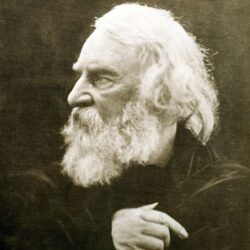
Henry Wadsworth Longfellow (February 27, 1807 – March 24, 1882) was an American poet and educator. Longfellow wrote predominantly lyric poems, known for their musicality and often presenting stories of mythology and legend. He became the most popular American poet of his day and also had success overseas. Longfellow was born in Portland, Maine, which was then a part of Massachusetts. He studied at Bowdoin College. After spending time in Europe he became a professor at Bowdoin and, later, at Harvard College. His first major poetry collections were Voices of the Night (1839) and Ballads and Other Poems (1841). Longfellow retired from teaching in 1854 to focus on his writing, living the remainder of his life in Cambridge, Massachusetts, in a former headquarters of George Washington. His first wife Mary Potter died in 1835 after a miscarriage. His second wife Frances Appleton died in 1861 after sustaining burns when her dress caught fire. After her death, Longfellow had difficulty writing poetry for a time and focused on his translation. He was the first American to translate Dante Alighieri's The Divine Comedy. He died in 1882.
Filter resources by Category
Filter resources by Tag
Filter resources by Collaborator Name
Filter resources by Language
Filter resources by Date Range
Contributed by:
Henry Wadsworth-Longfellow, Aharon N. Varady (transcription)
The poem, “Sandalphon,” as composed by Henry Wadsworth Longfellow (1807 – 1882) and completed January 18, 1858, first published in Birds of Passage (1858), section “Flight the First,” page 62. . . .

